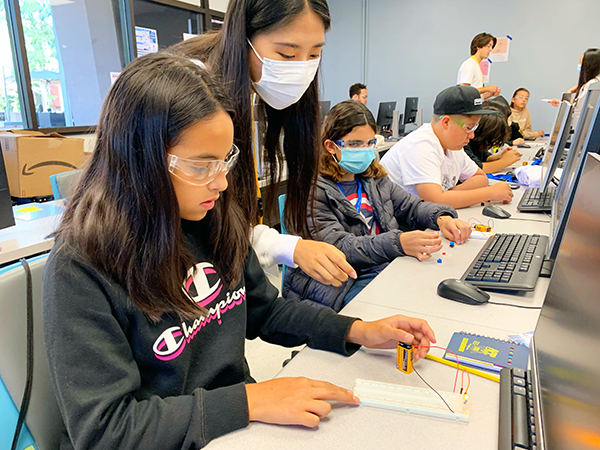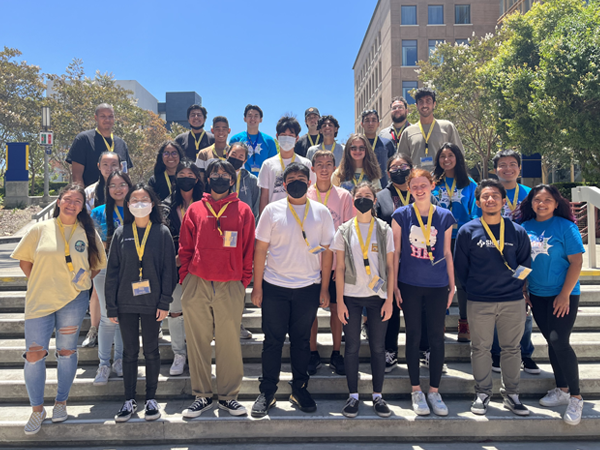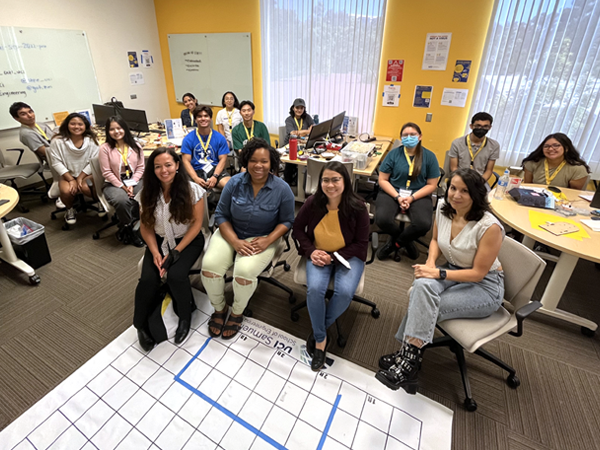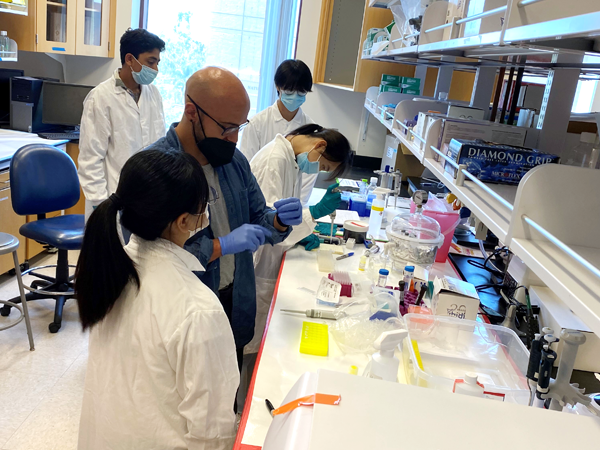Engineering Summer STEM Programs Make a Comeback
Sept. 20, 2022 - This summer saw the return of in-person STEM outreach activities at the Samueli School of Engineering. The school conducts a variety of outreach for youth and community college students to generate interest in STEM and expose participants to hands-on engineering and technology.
“Outreach programs play a crucial role in the overall mission of the University of California to serve our local communities,” said Marvin Maldonado, interim director of the Stacey Nicholas Office of Access and Inclusion (OAI). “Our STEM outreach initiatives prepare students across the entire pipeline, from K-12 to community college to the university level. We have a proven infrastructure and a passionate team that provide a variety of experiences, pathways and opportunities, particularly for underserved and underrepresented students, to be successful in engineering and computer science at UCI.”
FABcamp Turns 10

FABcamp celebrated its 10th anniversary this year with a scaled down two-week session. Established in 2013, FABcamp is for middle school students (6th through 8th grade). It offers participants the opportunity to learn about engineering disciplines as well as various fabrication and prototyping technologies in a fun-filled camp at the Samueli School of Engineering.
This year’s two-week scholarship camp, funded entirely by the Broadcom Foundation, was offered to students from three Santa Ana schools: El Sol Science and Arts Academy, Orange County Educational Arts Academy and the Samueli Academy. Twenty-six students attended and were introduced to computer aided design, rapid prototyping and fabrication technologies. They also engaged in hands-on computer programming projects utilizing the Raspberry Pi while learning fundamental coding principles. Over the course of the two weeks, participants interacted with UCI engineering faculty, UCI graduate and undergraduate students and near-peer mentors (FABcamp alumni who were serving as interns). The camp culminated in a Closing Ceremony where parents were invited to see the camper’s final projects, which included a Raspberry Pi-powered photo booth and an interactive mobile application using the APP Inventor platform.
“This summer was especially gratifying as we were able to return to in-person programs,” said Leyla Riley, director of Academic Innovation, Partnerships. “We started in the summer of 2013 with five core projects and a small team of undergraduate engineering majors. Since then, we have developed three different levels in the FABcamp series and created internship opportunities for those students who have completed all three levels. The Broadcom Foundation has supported us since the very beginning, which has allowed us to ensure the program is accessible to students from under-resourced communities.”
ASPIRE Inspires High Schoolers
The Stacey Nicholas Office of Access and Inclusion held two sessions of its outreach program for high school students called ASPIRE (Access Summer Program to Inspire Recruit and Enrich). Supervised by faculty and taught by experienced staff and graduate mentors, the program features hands-on design and programming activities to guide participants through projects tailored for high school students.

The first session, June 27-July 1, had 19 participants from multiple high schools across Los Angeles and Orange counties. During the week-long course, students learned how to design parts for laser cutting and 3D printing while also using the Raspberry Pi microcomputer to learn an intro to coding using the Python language. Using this newly gained knowledge, they worked in teams of three to four on an open-ended challenge in which they designed, coded and fabricated their own project and showcased it at the end of the week. They also toured the RapidTech fabrication lab, Esports Arena, and took a lap around Ring Road to see the campus.
The second session, July 11-15, had 15 participants and was taught by former OAI staff member and current informatics graduate student Ernest Garrison. The high schoolers learned how to setup up a Raspberry Pi system from scratch while exploring the topic of cyber security and how services like Amazon’s Alexa work. With this information, they were able to use the Pi to build their own custom version of Alexa through command-line processes. They also had the opportunity to design and print their own custom parts with CAD software and toured various spaces in the Samueli School and the general campus.
ASPIRE students ate lunch at the Brandywine dining area in the new Middle Earth residence hall, experiencing what it would be like to be a college student. Both ASPIRE sessions were free to participants, thanks to support from the Broadcom Foundation.
OAI Summer Transition Program

The Stacey Nicholas Office of Access and Inclusion hosted a group of incoming engineering and information and computer science first-year students for a week-long program, Aug. 29 to Sept. 2, to help prepare the students for their academic journey at UCI. Attendees came from as close as Santa Ana and as far as Palm Springs every day from 9 a.m. to 4 p.m.
They participated in a blend of workshops and panels and were given a technical challenge project that involved using the Raspberry Pi microcontroller. Workshops covered topics such as imposter syndrome and implicit bias and a True Colors self-assessment to help participants better know their own strengths and how to use them to optimally collaborate with others. The Student Wellness and Health Promotion Center spoke to the group and covered the variety of resources available to students focused on mental health and wellbeing.
Students were challenged to build an autonomous vehicle powered by the Raspberry Pi and then to navigate a particular route. They were able to 3D print and laser cut their own parts. Engineering Dean Magnus Egerstedt and ICS Dean Marios Papaefthymiou stopped by to welcome the students, chat and answer questions.
“One of the most impactful experiences for incoming students is to connect with existing UCI students and learning about ways to engage with the student organizations,” said Maldonado. Three student organizations -- The Society of Hispanic Professional Engineers (SHPE), Latinos in Science and Engineering (MAES), and Society of Woman Engineers (SWE) – talked with the students about their organizations and opportunities, then mingled with them and shared what life at UCI is like.
A highlight of the week was when four engineering faculty, all women, came to speak to the students about their research and academic journey, breaking down often-perceived barriers that students sometimes have about faculty. Undergraduate mentors worked with the incoming students and facilitated campus tours, joined them for lunch, and helped the teams with the technical challenge.
Undergraduate Student Initiative for Biomedical Research Provides Free Mini Research Experience
For more than a decade, biomedical engineering Associate Professor Michelle Digman has hosted the Undergraduate Student Initiative for Biomedical Research (USIBR) program, which exposes high school and community college students to quantitative biology and cutting-edge imaging technology at the Laboratory for Fluorescence Dynamics.

This year she accepted 27 individuals, nine highs schoolers and 18 community college students, for the free weeklong summer program. Students must apply to secure a spot. The week of activity featured lectures given by biomedical engineering professors and postdoctoral fellows, and provided students with the opportunity to complete a mini research project that tested hypothesis-driven biological questions. There were six groups that completed a mini-research project. Each group had a topic with a hypothesis and clear objectives on how to answer a research question. They all were exposed to hands-on experience with imaging, cell cultures and computational data analysis, and learned how to organize data, think logically and present information in front of peers.
“These practicals are not cookie cutter hands-on sessions,” explained Digman, “but are intended to inspire critical thinking and test new hypotheses currently being investigated in our scientific research lab.”
– Lori Brandt
